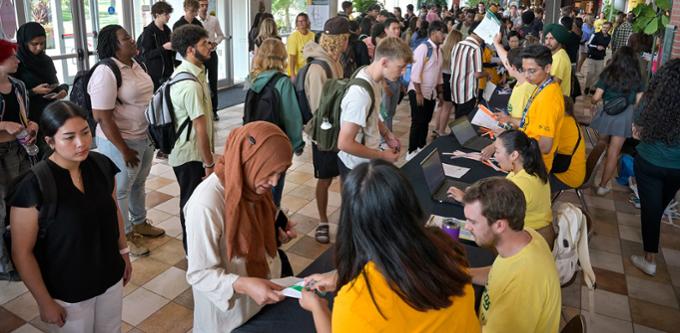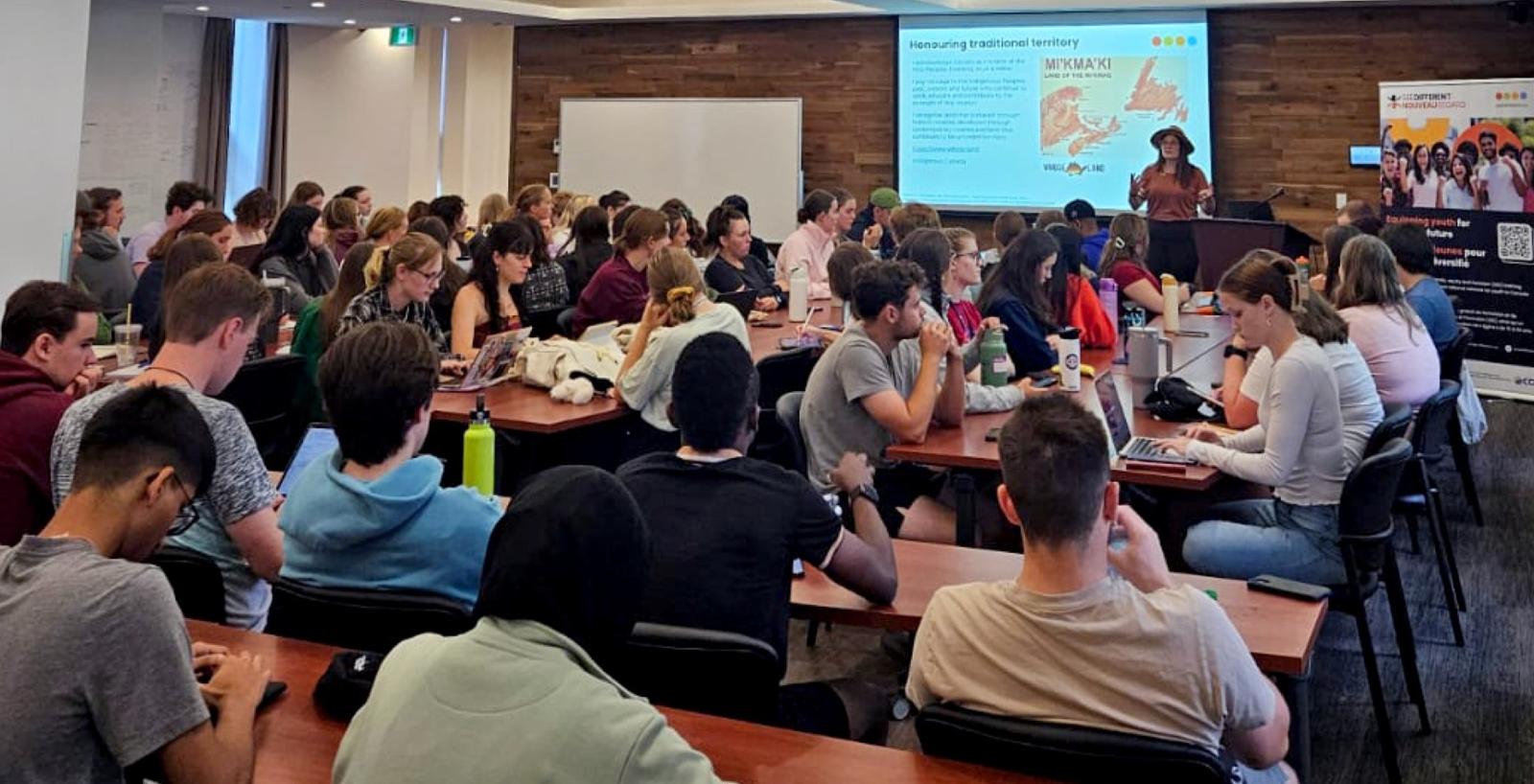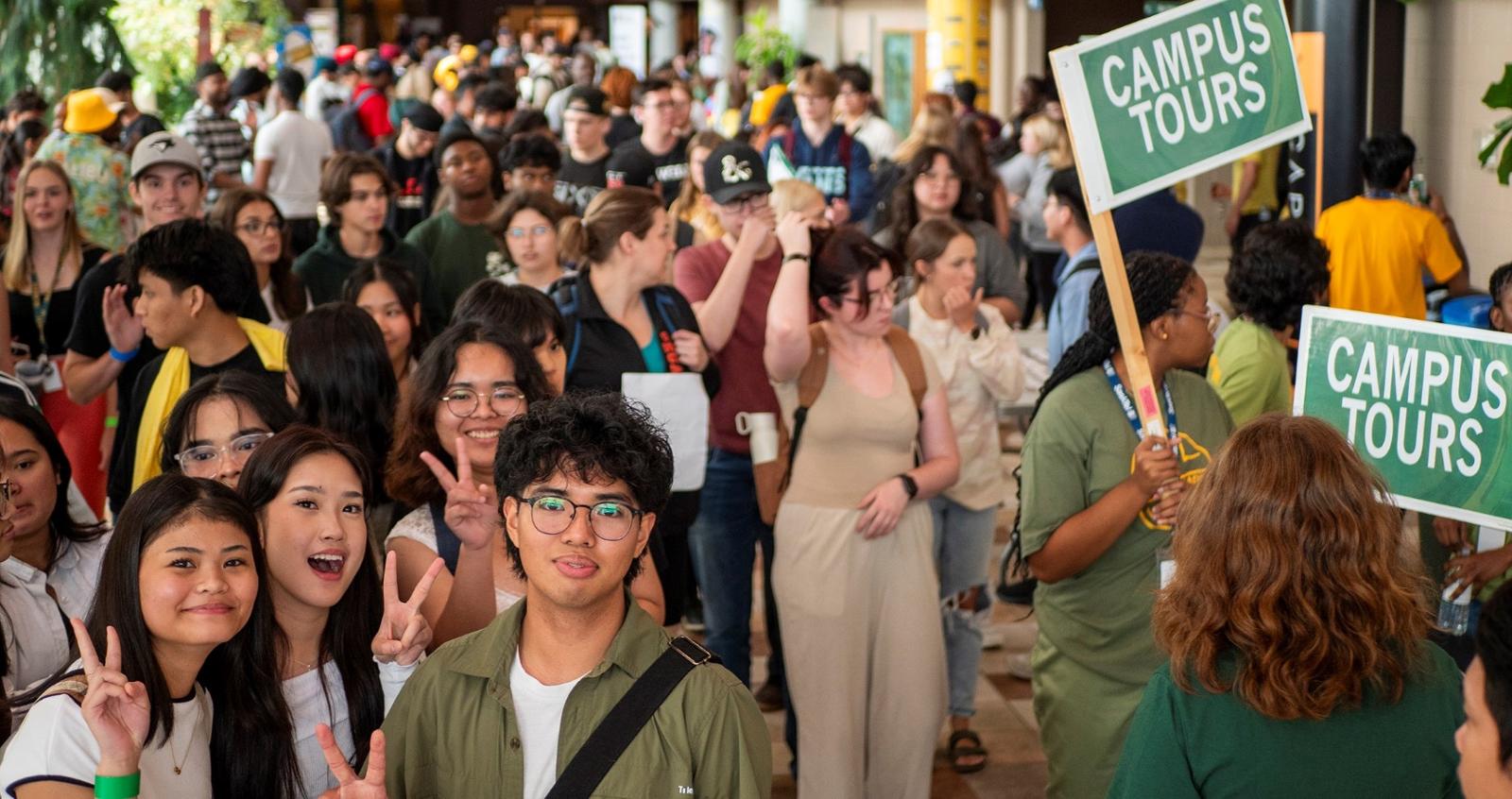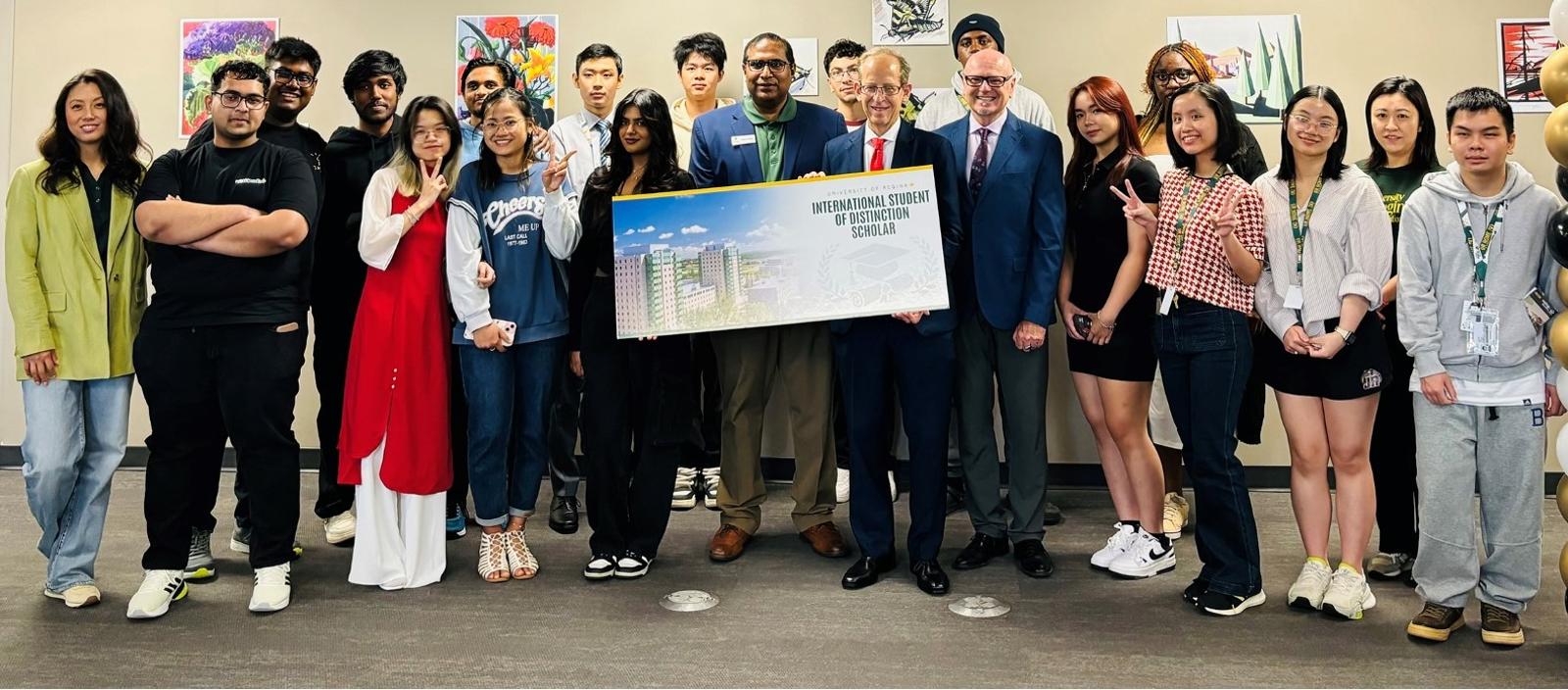The four U of R students profiled here have at least two things in common: they started at the U of R in the Fall 2023 term; and they achieved good grades in their first semester.
Wyatt Neufeld came to the U of R to take Human Kinetics in the Faculty of Kinesiology and Health Studies. A graduate of Swift Current Comprehensive High School, Wyatt chose to live in an on-campus residence at the U of R when he moved to Regina.
“Living in residence has a lot of benefits for someone coming from a smaller community,” says Wyatt. “You don’t have to deal with the complexities and troubles of Regina’s traffic, and it has allowed me to become more involved in activities taking place on campus.”
If you’re really struggling, talk to your prof or investigate resources the University offers that can help. Don’t get discouraged. — Nathaniel Hak, Faculty of Science student
Danveer Singh, with the Faculty of Arts is an international student from Punjab India. She completed high school at Doon International School and also says living in an on-campus residence was really helpful.
“My on-campus living experience has been amazing as it offers me multiple benefits ranging from being convenient, especially in winter, to having a safe and healthy social environment,” says Danveer. “I was completely unfamiliar with campus life and the people, but the social events and workshops for students living on campus encouraged and helped me to make many friends and get acquainted with the new lifestyle.”

Nathaniel Hak enrolled in Environmental Biology in the Faculty of Science. He graduated from Dr. Martin LeBoldus High School in Regina and then completed a two-year diploma in Wildlife and Fisheries Conservation from Lakeland College in Vermillion, Alberta.
Nathaniel says after attending Lakeland he chose to attend the U of R as it recognized his Lakeland experience, “It was important for me to be able to transfer my two-year diploma from Lakeland towards two years of credit at the U of R where I am now completing my degree.”
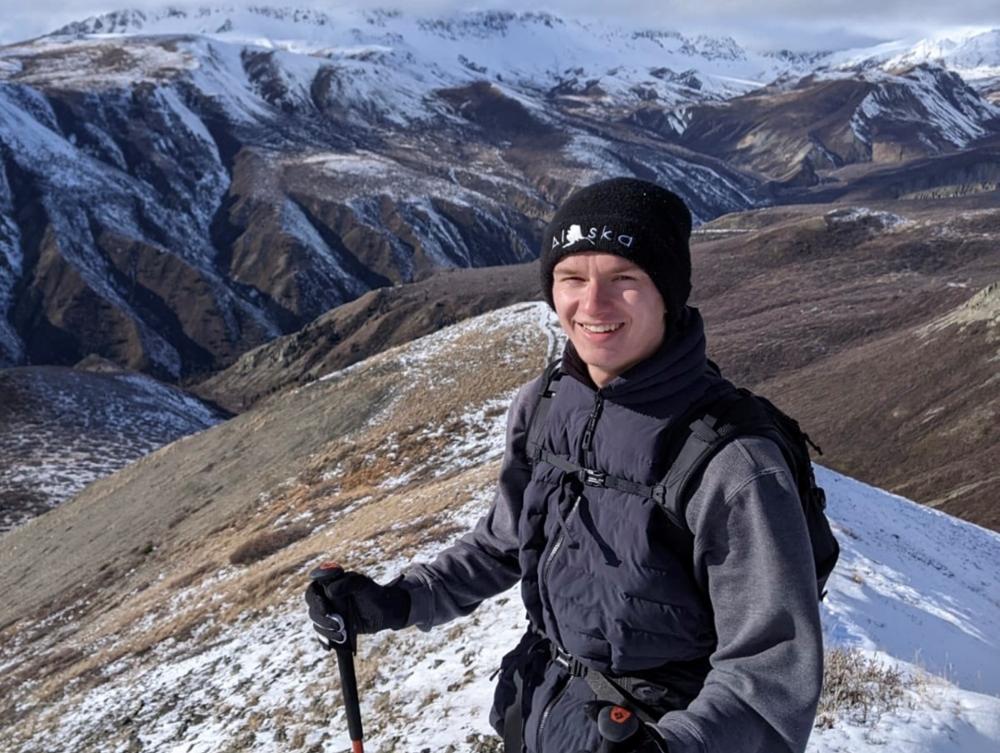
Santanna Kochylema, is taking Justice Studies in the Faculty of Arts. She graduated from Winston Knoll Collegiate 10 years ago and is interested in getting a law degree. Santanna says she is doing her prelaw program here as she isn’t quite ready to uproot her family to go to law school. “Regina is my home, so it is easier to go to university here and I really like the U of R, it has a very positive, welcoming environment.”
Advice for success
“I would advise other students to not be afraid to talk to your professors, work hard, but also have fun,” says Santanna. “I found the professors to be approachable and while they don’t hand-hold the students, they are very open and willing to help. It’s been very positive. The biggest challenge for me has been trying to balance my responsibilities at home, taking care of my son, working, and trying to do well in my classes and on assignments.”

Nathaniel says success is an individual thing, “I am a perfectionist and always try to get good grades and challenge myself to beat my previous grades. I find that studying is a very individual thing, so try to find what works for you and try not to compare your marks with others. Some people are stronger in some areas and may struggle in others. I just focus on improving my own marks and achievements.
“In classes where you may not be that strong, or not that interested in, it can be enough just to get passing grades. If you’re really struggling, talk to your prof or investigate resources the University offers that can help. Don’t get discouraged.”
Dedication, being punctual, self-study, and paying attention to the professors’ lectures and course material are of utmost importance. — Danveer Singh, Faculty of Arts student
Asked what he attributed his success to, Wyatt identifies three things:
“A good social group driven to succeed – helps you stay motivated, especially when times get stressful. Having a group of people all experiencing the same problems and issues really helps you overcome the obstacles you face.
“Engaging with your professors – realize that professors really want their students to succeed. It makes it easier to approach them to discuss course content, especially in subjects in which you are struggling.
“Learning to accept mistakes as a critical part of learning – nobody is perfect and if you fall short of extremely high standards, it can be demotivating. Setting realistic goals that still push you, allows you to be more adventurous in approaching projects and learning. Plus, if you meet or exceed those goals you can appreciate all the effort you put into the work.”

Danveer says, “Dedication, being punctual, self-study, and paying attention to the professors’ lectures and course material are of utmost importance. I was pretty sure that I would face challenges while adapting to university-level education, which I did, but with guidance and help from workshops and friends, I was soon able to adjust and undertake assignments confidently.
“I researched several Canadian universities and decided to study at the U of R as it has an amazing infrastructure, teaching faculty, and curriculum. I feel my success is due to the positive environment offered by the U of R, the professor’s teaching expertise, and my dedication to studying.”
Danveer also participated in the U of R Ambassador program which she says allowed her to explore the campus, gain confidence and meet new people, “I believe it is essential for new students to explore the University as much as possible as it helps to get to know about the services available to aid in academic work and also to socialize.”
Final thoughts
“I really enjoyed my Physical Geology class and although I found Macroeconomics to be much more challenging, it was also very interesting,” says Nathaniel. “I think it is important to explore the things you are interested in and to also try new things.”
“University is about learning, taking chances, and meeting new people, so enjoy it,” says Santanna.
“I feel the U of R emphasizes equipping students with the skills and knowledge that make them career-ready,” says Danveer. “For example, I hope to become a psychologist and the psychology program here allows me to explore various areas of psychology before deciding to study one in depth.”
“University will challenge you in some way or another,” says Wyatt. “Even if, by some chance, not academically, it will help you realize the parts of you that you can improve upon, and because of that, it is one hundred per cent worth it. By taking on the challenges that university throws at you, and committing to wanting to improve, you are allowing yourself to become a more fulfilled and successful person.”
Banner photo: First-year students at the U of R’s Fall 2024 orientation. Photo credit: U of R Photography.About the University of Regina
2024 marks our 50th anniversary as an independent University (although our roots as Regina College date back more than a century!). As we celebrate our past, we work towards a future that is as limitless as the prairie horizon. We support the health and well-being of our 17,000 students and provide them with hands-on learning opportunities to develop career-ready graduates – more than 90,000 alumni enrich communities in Saskatchewan and around the globe. Our research enterprise has grown to 21 research centres and 9 Canada Research Chairs. Our campuses are on Treaties 4 and 6 - the territories of the nêhiyawak, Anihšināpēk, Dakota, Lakota, and Nakoda peoples, and the homeland of the Michif/Métis nation. We seek to grow our relationships with Indigenous communities to build a more inclusive future.
Let’s go far, together.
